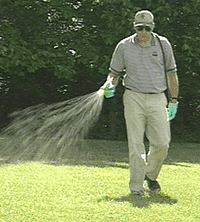Extension Pesticide Applicator Training Is Important but Unheralded Service
Extension Pesticide Applicator Training Is Important but Unheralded Service

Pesticide certification isn't necessarily a glamourous or entertaining process, but for the last 36 years county agents and state specialists of the Kentucky Cooperative Extension have provided that formal training for thousands of private and commercial applicators.
Although the lessons provide participants with a license to purchase restricted-use pesticides, the real value of the training is that the participants learn to protect themselves and the surrounding natural environment.
"All Kentuckians gain something from this certification training that is conducted at county Extension offices 800 to 900 times every year around the state," noted Lee Townsend, Extension entomologist in the UK College of Agriculture and coordinator of the state training program.
"If you subscribe to a lawn service, you benefit by having someone who knows what and how much chemical to use," said Townsend. "Kentucky's environment is cleaner because our commercial applicators and farmers learn to use the minimum amount of pesticide needed to control a specific pest. Even our roads are safer because workers spraying the weeds and insects must know how to use the equipment and chemicals."
Back in the mid-1970s, products were designated as restricted-use pesticides by the EPA because of potential hazards to the applicator or the environment. The labeling soon had nearly 60,000 Kentuckians seeking certification training from the Kentucky Cooperative Extension Service.
"At that time, our state was involved in one of the largest certification efforts in the country," said Townsend. "During that period, many Kentucky tobacco farmers used Methyl Bromide to fumigate their tobacco transplant beds. With the advent of float production transplants, the need for this rather dangerous fumigant went down dramatically."
Now the numbers of Kentucky participants have shrunk to about 35,000 farmers and landowners who attend the private applicator training that must be retaken every five years to maintain certification. The private applicator the training is done entirely through the county Extension offices.
Another 6,000 individuals go through commercial applicator certification which includes initial training sessions, a test, and then two mandatory update meetings during a five-year period to maintain their certified status. Those meetings are held in regional sites and are taught by state Extension specialists and representatives from commercial companies and other state agencies.
"Our Extension agents deserve a lot of credit for the county-based certification training," noted Townsend. "Some agents train several hundred producers every year and many of those meetings must be held at night or on weekends to insure that everyone can get the training."
The certification program is tailored to at least three specific regions of the state and is based on the needs of producers and landowners and the types of farming they conduct.
In Owen county, the primary users of restricted pesticides are grain and tobacco farmers.
"There's not much glamor in this type of work," said Kim Strohmeier, Owen county Extension agent for agriculture. "I try to make the certification process as interesting as possible. I think over a period of time it has helped to make farmers more aware of how to use pesticides in a safe and responsible manner."
Pulaski county Extension agent Keenan Turner has seen thousands of people go through the private applicator certification. Now he has added local commercial applicator training sessions to cut down on travel time for his clients.
"It's an excellent program to teach safety issues," said Turner. "It also provides me with solid proof for our city residents that our county's farmers are environmentally friendly and our producers learn to be financially responsible... an improperly calibrated sprayer can cost a producer big money!"
Along with conducting periodic training to keep about 600 private applicators certified, Hopkins county agent George Kelly takes the certification process to the schools.
"I have provided training for 70 vocational agriculture students," said Kelly. "We also have homeowners that take the training. It's a good tool to remind everyone of the importance of the pesticide label, how to properly apply pesticides and how to protect workers from exposure problems."
"Pesticide certification training is rapidly changing," said Townsend. "The need for basic training and updates remains high."
Until the list of restricted use pesticides disappears in favor of safer but effective alternatives, people who need the certification should check with the local county Extension agent for all the details.